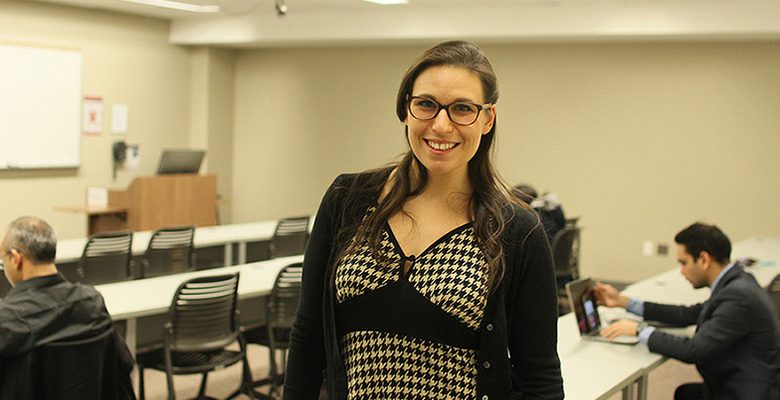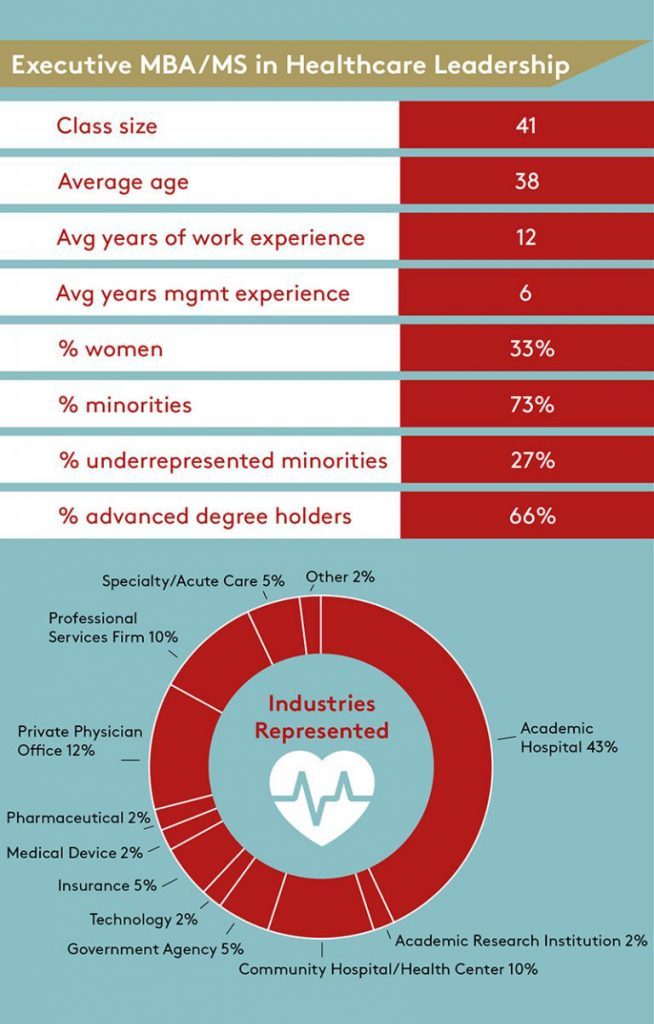Rutgers Supply Chain Analytics Student Spends Summer at Amazon, and More – New York News

Let’s explore some of the most interesting stories that have emerged from New York business schools this week.
Beginning a Career in Supply Chain at Amazon – Rutgers Business School
Rutgers Business School exchange student Qiying Xu recently had an opportunity to put her supply chain management theory and Lean Six Sigma course work to use as part of an entry-level management position she will pursue at one of Amazon’s new fulfillment centers.
Xu writes that the Rutgers specialty master’s program in supply chain analytics gave her “the picture of the whole supply chain. The data analytics skills she’s accrued have almost single-handedly “changed the course of [her] career.”
You can read the full article on Xu’s work here.
Bridging the Gap Between Politics and Renewables – Johnson Business Feed
In a new op-ed with his alma mater, recent Johnson SOM graduate Mark DesMeules, MBA ’18, wrote about the role his school played in his career pivot from politics.
“I came to Johnson to accomplish what is colloquially known in the MBA world as a ‘career pivot.’ Prior to joining the Johnson community, I worked in politics in the nation’s capital—Washington DC. After gaining nearly five years of advocacy experience through my work with start-ups, non-profits, and Fortune 500s on intellectual property and technology policy issues, I decided to shift my career trajectory toward an industry I had always been passionate about: renewable energy.”
DesMeules writes that he was immediately sold on Johnson because of the school’s “robust academic and extracurricular offerings on sustainability and renewable energy.”
He elaborates, “At Johnson, I had the chance to explore the intersection of energy, sustainability, and business, all while becoming comfortable with ambiguity and complex business problems.”
“My Johnson colleagues, peers, and professors helped me learn, grow, and successfully pivot from the world of policy to the renewable energy industry. I am excited for the future and look forward to continuing to grow in the next chapter of my career.”
You can read the full op-ed from DesMeules here.
Governor Phil Murphy Selects Stevens to Announce New STEM Initiatives – Stevens Institute of Technology Blog
New Jersey Governor Phil Murphy recently visited Stevens Institute of Technology School of Business’ ABS Engineering Center to announce “two new STEM initiatives to retain highly-trained, technology-savvy college graduates in the state.”
The first is a “loan forgiveness program,” which will see “anyone who has worked in a STEM-related job in New Jersey for at least four years receive $2,000 per year, in years 5,6,7,8 at the same job, for a total benefit of $8,000. Employers and the state would split the covered amount 50/50.”

NJ Gov. Phil Murphy speaking at the Stevens Institute of Technology School of Business / Photo via stevens.edu
The second is an internship program for high school and college students in STEM fields, which reimburses “participating employers 50 percent of intern wages, up to $1,500 per student.”
Murphy said, “Stevens is one of the premier places where tomorrow’s leaders in innovation are learning the skills they will need to be successful and to change our world. If we are to grow the innovation economy again, we cannot lose our college graduates after graduation. I want them to stay here, in New Jersey, to be part of our economic future.”
Check out the full article here.
Cornell’s Business Impact Symposium Returns, and More – New York News

Let’s explore some of the most interesting stories that have emerged from New York City business schools this week.
Cornell Business Impact Symposium: Bridging Sustainability and Enterprise – Johnson Business Blog
Cornell’s SC Johnson Graduate School of Management Center for Sustainable Global Enterprise hosted this year’s Cornell Business Impact Symposium (CBIS), which featured sustainability experts from the food, fashion, technology, and finance industries. Current MBA students shared their takeaways from the symposium on the Johnson Business Blog.
René Bonomi, MBA ’19, cited the “Combating Climate Change with Clean Energy Innovations” panel as a highlight, which surveyed “trends in the energy industry, such as storage improvement, and illuminating innovative start ups such as Dimensional Energy and Energy.”
Sarah Theobald, MBA ’19, was struck by the “From Fashion to Food: Excursions through Sustainable Supply Chain” panel, which “covered an array of hot topics from supply chain traceability and upcycling to the challenges of measuring social impact as well as reconciling emerging market manufacturing practices with United States corporate standards.”

Left to right; Martie Curran (Nestle Waters), Funlola Otukoya (CDP), Eileen Quigley (NRDC), Michael Van Brunt (Covanta Energy), and Jim Armstrong (Climate Changers) / Photo via johnson.cornell.edu
Read more about this year’s CBIS here.
Podcast: Mark Conrad on the Business of Sports – Gabelli Connect
The American sports industry, somehow, is becoming a bigger monolith than ever before. In fact, Forbes projects the professional sports market in the United States to grow from $60 billion to $73 billion by 2019.
Recently, Fordham University Gabelli School of Business associate professor and sports business concentration director Mark Conrad was a featured guest on a Fordham-produced podcast to discuss his organizational predictions for the NFL, Major League Baseball, and NCAA.
You can listen to the interview with Conrad below and find out more here.
A Summer Class Set in Israel – Rutgers Business School Blog
Rutgers Business School Entrepreneurship professor Gary Minkoff has spearheaded a three-week long summer course entitled Doing Business in Israel, which will “introduce students to the entrepreneurial culture and business world inside Israel,” including local Israeli aerospace, artificial intelligence, biometrics, clean technology cybersecurity, pharmaceutical engineering, robotics, and venture investment industries.
“We’re teaching entrepreneurship and innovation, so why not connect students with places where that’s happening. This course aims to plant many seeds for potential collaborations between Rutgers students and Israeli entrepreneurs and innovators,” Minkoff said.
You can learn more about the course here.
Cornell FinTech Disruption, Crowd-Funding Wisdom, and More – New York News

Let’s explore some of the most interesting stories that have emerged from New York City business schools this week.
Fintech is Disrupting the Disruptors, and We’re Ready For It – Johnson School of Management Blog
S.C. Johnson Graduate School of Management MBA candidate Arjun Devgan, ’18, highlighted how FinTech inventions such as cryptocurrencies, peer-to-peer lending, and smart insurance have begun to disrupt a post-PayPal landscape, which at one point disrupted traditional banking.
Devgan writes about two Cornell Tech intensives designed to “equip students to solve business problems in this age of digital transformation:” the digital marketing intensive and the fintech intensive.
“With my background in payments and remittances, the fintech intensive program offered me a launchpad to dive deep into the world of financial technology. Classes such as the Fintech Practicum, Business Models, Cryptocurrencies, and a Field Project with one of Citi Ventures’ portfolio companies offer a great combination of basic theoretical concepts and real-world experiential learning.”
Learn more about Johnson’s FinTech and Digital Marketing Intensives here.
Want People to Fund your Kickstarter Project? Sell Them on Your Reputation First – Binghamton School of Management Blog
Binghamton School of Management associate professor Ali Alper Yayla presented a new paper at the 51st Hawaii International Conference on System Sciences, which found that potential Kickstarter backers are more concerned about a producer’s “ethical characteristics than their actual ability to make and deliver the product.” Professor Yayla writes:
“We found that people worry more about the seller’s honesty than whether the seller actually has the ability and knowledge to finish and deliver on the product. People don’t want sellers to just take their money and run. Crowdfunding is interesting because you’re literally buying something that isn’t finished from a person who has never made it before. There are no product reviews, and there are no seller reviews.”
Read more about Yayla’s research here.
Can Mark Zuckerberg Fix Facebook’s Mess? – Forbes
In Len Sherman’s recent Forbes article “Can Mark Zuckerberg Fix Facebook’s Mess?”, the Columbia Business School executive in residence and adjunct professor noted the company’s seemingly astounding naivety of how much information was secretly (or not so secretly) being scrubbed for use by third party companies like Cambridge Analytica.
“It’s been hard to fathom how a company reputed to be run by one of the world’s most brilliant digirati, could have been so naïve in not recognizing the risks in giving outside developers broad access to Facebook’s user data, so lax in failing to ensure that rogue data in malevolent hands was destroyed before it could be weaponized, and so reluctant to advise users that their personal information was (and still is) floating around cyberspace. In short, what was Mark Zuckerberg thinking?”
Sherman theorizes that part of the issue is Zuckerberg’s sincere overconfidence that technology and innovation can only be used for a greater good, rather than being possibly manipulated by less-than-ideal forces. This, Sherman continues, was all done despite a litany of data that proved Facebook’s nefarious actors and less-than-strict partnerships were actively making the platform less safe year by year.
Click here to see the rest of Sherman’s work with Forbes.
How a Rutgers Part-Time MBA Led to a Dream Job, and More – New York News

Let’s explore some of the most interesting stories that have emerged from New York City business schools this week.
Part-Time MBA Proves to be a Steppingstone to Dream Job – Rutgers Business School
From running phone sales in Manhattan, to working her way up the corporate business to business ladder, Allegra Kipnis, a part-time MBA candidate from the Rutgers Business School in New Brunswick, found her “dream job.”
In a recent profile with the school, Kipnis divulged that earning her MBA helped her earn multiple promotions with Verizon. But, even after being let go, she (with the help of the Rutgers community) helped her refine her career path on the way to a dream role with Panasonic as an internal communications specialist.
“The MBA program gave me the tools I needed to eventually land my dream job, but funny enough, after all I had learned, it turned out to be just one more step in the story of my career,” she said in the interview.

Kipnis, a part-time MBA candidate at Rutgers / photo via Rutgers.edu
You can more about Kipnis’ career path and the Rutgers Business School part-time MBA program here.
A Combination of Personality Traits Might Make You More Addicted to Social Networks – Binghamton School of Management
The Binghamton University School of Management recently published new research, “Personality Predictors of IT Addiction,” in which assistant professor of management information systems Isaac Vaghefi, along with DePaul’s Hamed Qahri-Saremi, examined which collection of personality traits often leads to social networking addiction among 300 college-aged students: neuroticism, conscientiousness, and agreeableness. Vaghefi writes:
“It’s more of a holistic approach to discover what kind of people are more likely to develop an addiction. Rather than just focusing on one personality trait, this allows you to look at an all-inclusive personality profile.”
Read more about the duo’s research here.
Admissions Bridge Connects Diverse Undergraduates to MBA Possibilities – Johnson School of Management Feed
The SC Johnson School of Management blog recently published an overview of the school’s second annual Johnson Admissions Bridge—an event that encourages “undergraduate women and students from underrepresented backgrounds at Cornell to consider business school and discover ways to begin preparing now.”
The Bridge is “part of a larger initiative to ensure a diverse population is offered the opportunity to attend business school.” Judi Byers, executive director of admissions and financial aid at Johnson, explains:
“At Johnson, we have both an opportunity and a responsibility to contribute to the pipeline of diverse talent ultimately seeking entry into top business schools and the companies and organizations they will lead afterward. The Bridge is a way to connect with our undergraduate students here at Cornell and gives us the chance to talk with them about potential career paths and how an MBA might offer value to their short and long term career goals.”
Learn more about the Cornell Bridge here.
Columbia Explores Power In News, and More – New York News

Let’s explore some of the most interesting stories that have emerged from New York City business schools this week.
Which News Outlets Have the Most Power? – Columbia Newsroom
Columbia Business School recently published research surveyed from 18 different countries, which uncovers that “television news is by far the most dominant and influential news source and the number of news sources that people rely upon and trust has a direct correlation with their income levels.”
CBS professor of business Andrea Prat explains, “Countries around the world are experiencing information inequality, with a distinct subset of the population depending on just one or two sources for news. In turn, this makes a certain set of large news organizations particularly powerful.”
The research points out several different, important conclusions:
- “Television-based organizations are the most powerful commercial news organizations.“
- “News sources that cater to information-poor audiences have greater ‘media power.’”
- “News consumption appears to be highly unequal.”
- “There is no evidence that public service broadcasting reduces information inequality.”
You can read more from the report here.
Toys ‘R’ Us is Just the Latest Nostalgic Retailer to Die – CNN Money
“Another one bites the dust,” writes CNN Money journalist Danielle Wiener-Bronner, remarking the full-scale closure of the once-iconic toy distribution empire Toys ‘R’ Us. Wiener-Bronner notes that the closure comes around six month after the chain filed for bankruptcy in fall of 2017, struggling for years to compete with other distribution chains like Wal-Mart and Amazon.

A photo of the grand opening of the Toys ‘R’ Us store in Manhattan. The 70-year-old former retail giant will soon be liquidating all of its U.S. and UK locations. Photo via AP/Richard Drew
Tulin Erdem, chair of NYU Stern‘s Marketing Department, spoke with Wiener-Bronner about the news, noting that while nostalgia can be very powerful when it comes to marketing, it just isn’t enough sometimes.
“You can have a comeback with [nostalgia], but you can’t sustain it,” she said.
While Toys ‘R’ Us stores will be effectively shutting down in the U.S. and UK, and upwards of 30,000 employers will lose their positions, the closure will never erase the sheer joy of driving a 2-seater child rider car in a department store. You can read the rest of the CNN Money report here.
Zarb Introduces New Co-Op MBA Program – Hofstra University Zarb School of Business
The Hofstra University Zarb School of Business recently announced a completely new full-time two-year Co-Op MBA, which includes a six-month paid co-op experience opportunity at a leading regionally based corporation.
“Hofstra University’s Co-Op MBA program provides students with an integrated educational and professional work experience in their field of study, allowing them to expand their experience and responsibility,” the school noted in a recent press release. “With New York City’s business community only 25 miles away, you’ll also have access to many non-classroom learning experiences.”
The program requires the completion of 38 to 45 credits, with classes available full-time, both day and night. The co-hort size will be between 25 and 30 students, offering 12 separate concentrations, including: accounting, business analytics, finance, and more.
Click here to learn more about the school’s newest program.
Bloomberg Businessweek Praises Rutgers, and More – New York News

Let’s explore some of the most interesting stories that have emerged from New York business schools this week.
Bloomberg Ranks Rutgers MBA No. 1 in the Northeast in Job Placement – Rutgers Business Blog
In its “Best Graduate Business Schools of 2017 ” survey, Bloomberg Businessweek ranked Rutgers Business School (Newark, New Brunswick) as the top business school in terms of job placement within the Northeastern United States,. coming in second overall in the United States. Andy Heller, RBS MBA ’11 and current senior associate director of payor and health system marketing at Boehringer Ingelheim sang Rutgers’ praises in terms of preparing him to succeed in the corporate world.
“That kind of experience has helped me each and every day since graduation. Having diverse perspectives on our team ensured that our solutions would be differentiated, yet relevant, and impactful,” Heller notes.
In addition, RBS topped its fellow Big Ten competitors when it came to return on investment, narrowly edging out the University of Iowa College of Business, and Northwestern University’s Kellogg School of Management. The latter of which offered a higher multi-year ROI for potential MBA students, but cost much more in terms of tuition.
Read more about Rutgers’ rankings and accolades here.
Are You a Good Fit for the Executive MBA/MS in Healthcare Leadership Program? – Johnson Business Feed
The Executive MBA/MS in Healthcare Leadership program at Cornell’s SC Johnson School of Management “integrates the general management curriculum of Johnson’s Executive MBA programs with the deep healthcare expertise of Weill Cornell Medicine’s Healthcare Policy and Research Department.” The joint program was developed to “reflect the future of healthcare” and help “sharpen and deepen the skill sets of healthcare professionals through business and healthcare leadership education,” according to the school.
“Today’s healthcare leaders need to be open to knowledge from different vantage points so they can advance progressive healthcare agendas, locally and nationally. Many healthcare leadership programs are exclusively for physicians. However, as we developed this new program, the physicians we spoke to expressed interest in an executive healthcare program that welcomed non-clinicians from different sectors of healthcare—not just practitioners.”
Take a look at the makeup of the Executive program below:

You can read here to learn more about what the program looks for in terms of applicants.
Rewiring Hidden Biases for Better Outcomes – Gabelli Connect
Fordham University’s Gabelli School of Business recently hosted a talk by Harvard professor of social ethics Mahzarin Banaji who unpacked the hidden biases of well-intentioned people—that is, “the beliefs that live in the subconscious and are formulated due to various exposures throughout one’s life.”
Banaji explains:
“A bias is nothing more than a tilting away from neutrality. There’s bias in the mind of the receiver and the applicant. We have to work with the very groups that are holding themselves back and educate those who are holding them back. We are capable of change by how many times we stretch those muscles.”
Learn more about Banaji’s take on unconscious biases here.
